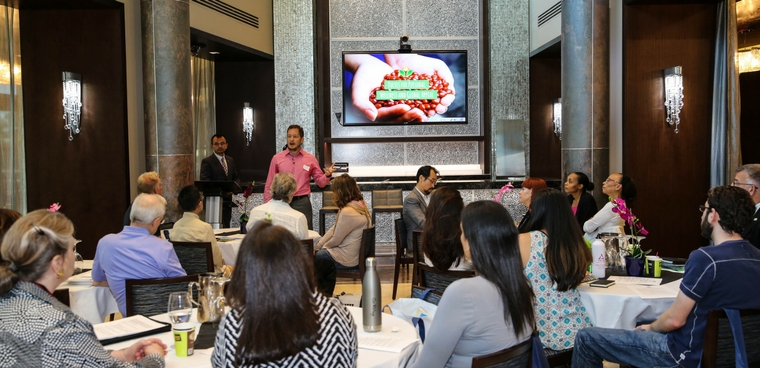By ASHLYN TOLEDO
The American Pulse Association hosted the first Pulse Innovation Miami event at the Chaplin School of Hospitality & Tourism Management on Saturday, October 22, 2016, to raise awareness about pulses – the dried seeds of legume plants such as lentils, chickpeas and other dry beans. The event also celebrated the United Nations’ designation of 2016 as the International Year of Pulses.
Pulses play an important role in human health. Because they are both rich in nutrients and very inexpensive to farm, environmental scientists and health experts alike believe pulses are a key part of our agricultural future.
Brian Machovina studied ecology and food sustainability as a doctoral student with the Department of Biological Sciences at FIU. He was a guest speaker at the event and believes we should all be eating more plants. For years he has advocated a 90/10 diet, where just 10% of your food intake comes from animal products.
“Increasing the consumption of pulses is a very important – and delicious – strategy for promoting environmental sustainability,” he said. “Pulses are a great source of protein that can help us reduce our intake of meat. By replacing some of our meat consumption with pulses, we can help reduce the amount of land required to produce food and the large amounts of soil erosion, water use, chemical biocide use, antibiotic use and biodiversity loss associated with livestock production.”
Robyn Webb, a nutritionist and award-winning cookbook author who specializes in diabetes, was a panelist at the event. She recommends pulses to many of her clients.
“Pulses are perfect,” she said. “I personally eat pulses most days…they are the perfect food to control blood sugar, which in turn prevents diabetes complications.”
As part of the event, guests were treated to a seven-course pulse tasting and cooking demonstration led by the United Nations Food and Agriculture Organization’s Pulse chef, Ron Pickarski.
After years of being overweight and struggling with health issues, Pickarski became a vegetarian. He quickly saw dramatic changes in his health and well being, and has since devoted his life to researching and developing all-natural, vegan or vegetarian dishes that are tasty and nutritious.
Wanda Rowe attended the event to learn about Chef Pickarski’s new and innovative ways to cook some of her favorite beans. Growing up in the South, beans were a big part of her diet. She was surprised to see all the tasty ways pulses are being used in modern cuisine.
“We ate a lot of beans – red beans, pinto beans, black-eyed peas on New Year’s Eve, which is a traditional Southern dish – so I’m very accustomed to it,” she said. “I shop for a lot of pulses, mainly because the price is very good and it goes a long way. I think I’m getting tired of the ways I’ve been cooking, so now, I can try new ways and new menus. I’m excited about it.”
Machovina believes schools like Chaplin will play an integral part in introducing pulses to a wider audience.
“The Chaplin School and other hospitality management programs are not only at the center of guiding how people eat and entertain, they are also at the core of guiding global environmental sustainability,” he said. “As someone who has worked as a conservation biologist, I find it fascinating that the leaders in the food and hospitality industry hold one of the most powerful keys to environmental sustainability. By inspiring others to serve and eat pulses and other plant-based foods, they are actively driving what I feel is the most important conservation effort.”
Other guest speakers at the event included Eric von Wettberg, Associate Professor at FIU’s Department of Biological Sciences; Ellen Kanner, vegan author and columnist for The Miami Herald and Carolina Molea, chef and founder of the Whisk Bakery & Cafe.
Dr. Michael Cheng, director of the Food and Beverage Program at the Chaplin School, was instrumental in bringing this event to FIU and helping to advance the Chaplin School’s vision of becoming a food and beverage research center.
To learn more about Chaplin’s food and beverage science initiative, click here.







